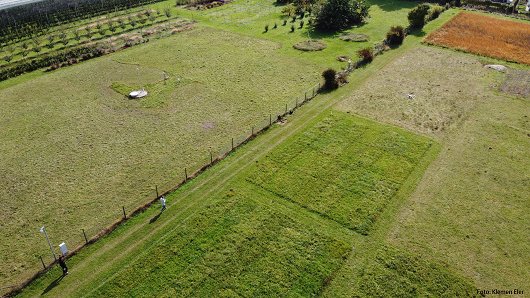The Faculty of Agriculture in Ljubljana was founded in 1947. With diversification of other fields, the Biotechnical Faculty was founded in 1960, and the Department of Agronomy is nowadays one of its seven Departments.
At the Department of Agronomy, students are educated in the field of agronomy and horticulture at all academic levels. At the first Bologna level, two studies are offered to the students. The first is a high-school professional study of Agriculture - agronomy and horticulture, which is hands-on, and the second is a university study of Agriculture - agronomy, which provides basic knowledge of natural sciences, social science and agricultural technologies and is being upgraded in second-level study programmes. At the second Bologna level, two Master studies are offered: Agronomy, which upgrades the knowledge and skills of students in the field of natural science basics of plant production, with an emphasis on an integrated approach to land management and on environmental protection, and a Master study of Horticulture, which delivers interdisciplinary knowledge necessary for the successful production of horticultural plants, with emphasise on the sustainable development of agricultural land. At the third study level, the fields of Agronomy and Horticulture are managed by our department within the interdisciplinary doctoral study programme “Biosciences”.
Pedagogical activities are successfully linked and upgraded with basic and applied research work, which is extremely wide and diversified at the Department of Agronomy, due to the interdisciplinary nature of agronomy and horticulture. Both fields cover all aspects of crop production, such as modern technologies that enable the cost-effective production of healthy and safe food in horticulture and agriculture; at the same time, they also provide care for land management, agricultural management, development of rural areas and, last but not least, protection of the environment.
The work is organised in six chairs, each covering a certain scientific field, while at the same time, within the three programme groups, research work intertwines and links chairs within the department with other research institutions in Slovenia and abroad.
Basic research at the Department of Agronomy is orientated towards the discovery and understanding of the functions of agricultural plants, physiological processes in various stress conditions, the identification of the natural conditions necessary for the growth of individual crops, the response of plants to various environmental factors in different ecosystems, the mechanisms of resistance to stress conditions and the adaptability of agricultural plants to various environmental factors. The primary and secondary metabolites and the hormonal status of agricultural plants are also investigated. In this context, research is focused on abiotic factors and the presence of air and soil pollutants, whose activities are often caused by humans in both natural and agro-ecosystems. Different aspects of soil fertility and soil contamination, the fate of inorganic and organic potentially toxic substances in the soil and their transition into the food chain and other segments of the environment are also studied. Diverse remediation technologies for cleaning of contaminated soil have been developed. Mechanisms of the acceptance and distribution of nutrients in the plant-soil-environment system have been studied, with an emphasis on the quality of crops, and various modern technologies of cultivation of agricultural plants have been tested as well. Biotic and biotechnical ways of plant protections against pests and diseases have been assessed. Research activities also include genomics and proteomics of agricultural plants and plant pathogens, mechanisms of natural resistance of plants against diseases and pests, genome studies, gene transformation techniques and micropropagation. Methods of induction of haploid plants have been developed, and interspecies crossings and breeding of new varieties of agricultural plants have been performed. The economic and sociological characteristics of the rural populations and the developmental factors of the countryside and the socio-economic interactions between agriculture and environmental protection have been explored. Socio-economic development strategies and market models, weather impact models on growth and development of plants, and the developmental models of plant diseases and pests have been studied. We also disseminate the debate of climatic changes and study their causes, the scale and possible scenarios of the future climate. Regulations of water circulation and nutrients have been studied, and the developments of new agricultural machines and new technologies for the production of safe food have been discussed.

